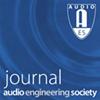开放式HRTF数值计算软件的最新进展
IF 1.6
4区 工程技术
Q3 ACOUSTICS
引用次数: 2
摘要
Mesh2HRTF 1。x是一个开源的、完全可脚本化的端到端管道,用于头部相关传递函数(hrtf)的数值计算。计算是基于听者身体部位的三维网格,如头部、耳廓和躯干。Mesh2HRTF的数值核心是用c++编写的,采用边界元法求解亥姆霍兹方程。该方法采用多级快速多极方法进行加速,并且可以很容易地并行化以进一步加快计算速度。最近重构的Mesh2HRTF 1框架。x包含准备网格的工具,以及计算出的hrtf的具体后处理和检查。由此产生的hrtf以空间导向格式保存,用于声学直接适用于虚拟和增强现实应用以及心理声学研究。Mesh2HRTF 1。X代码是自动测试,以确保高质量和可靠性。一个全面的在线文档可以方便地访问用户没有深入的声学模拟知识。本文章由计算机程序翻译,如有差异,请以英文原文为准。
Recent Advances in an Open Software for Numerical HRTF Calculation
Mesh2HRTF 1.x is an open-source and fully scriptable end-to-end pipeline for the numerical calculation of head-related transfer functions (HRTFs). The calculations are based on 3D meshes of listener’s body parts such as the head, pinna, and torso. The numerical core of Mesh2HRTF is written in C++ and employs the boundary-element method for solving the Helmholtz equation. It is accelerated by a multilevel fast multipole method and can easily be parallelized to further speed up the computations. The recently refactored framework of Mesh2HRTF 1.x contains tools for preparing the meshes as well as specific post-processing and inspection of the calculated HRTFs. The resulting HRTFs are saved in the spatially oriented format for acoustics being directly applicable in virtual and augmented reality applications and psychoacoustic research. The Mesh2HRTF 1.x code is automatically tested to assure high quality and reliability. A comprehensive online documentation enables easy access for users without in-depth knowledge of acoustic simulations.
求助全文
通过发布文献求助,成功后即可免费获取论文全文。
去求助
来源期刊

Journal of the Audio Engineering Society
工程技术-工程:综合
CiteScore
3.50
自引率
14.30%
发文量
53
审稿时长
1 months
期刊介绍:
The Journal of the Audio Engineering Society — the official publication of the AES — is the only peer-reviewed journal devoted exclusively to audio technology. Published 10 times each year, it is available to all AES members and subscribers.
The Journal contains state-of-the-art technical papers and engineering reports; feature articles covering timely topics; pre and post reports of AES conventions and other society activities; news from AES sections around the world; Standards and Education Committee work; membership news, patents, new products, and newsworthy developments in the field of audio.
 求助内容:
求助内容: 应助结果提醒方式:
应助结果提醒方式:


